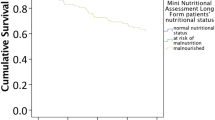Abstract
Objective
To compare the mortality-predictive ability of the full- and short-form (SF) Mini Nutritional Assessment (MNA).
Design
A prospective cohort study.
Setting
Population-representative sample.
Participants
2872 ≥65-year old men and women.
Measurements
The study analyzed 1999 and 2003 datasets of the Taiwan Longitudinal Survey on Aging (TLSA). Subjects were graded for nutritional status with the full-MNA and MNA-SF of a Taiwanese-specific version (T2, containing calf circumference instead of BMI) at baseline (1999) and tracked their survival status for 4 years. Mortality-predictive abilities of the full-MNA and MNA-SF were compared using Cox regression analysis and Net Reclassification Improvement (NRI).
Results
The full-MNA and MNA-SF have comparable abilities in predicting follow-up 4-year mortality risk according to the hazard ratios (all p<0.001) and Akaike information criterion (AIC). It also showed a slight improvement (not significant) if the full-MNA in a predictive model was replaced by the MNA-SF (NRI=0.09%, p=0.956).
Conclusion
The MNA-SF has at least comparable or even slightly better ability in predicting follow-up 4-year mortality risk of elderly Taiwanese. Results suggest that MNA-SF with calf circumference may possess some basic characteristics of a comprehensive and universal geriatric screening scale.
Similar content being viewed by others
References
Keller HH. Nutrition and health-related quality of life in frail older adults. J Nutr Health Aging. 2004; 8:245–252.
Guigoz Y, Lauque S, Vellas BJ. Identifying the elderly at risk for malnutrition. The Mini Nutritional Assessment. Clin Geriatr Med 2002; 18, 737–757.
Vellas B, Guigoz Y, Garry PJ et al. The mini nutritional assessment (MNA) and its use in grading the nutritional state of the elderly patients. Nutrition 1999;15:116–122.
Rubenstein LZ, Harker JO, Salva A et al. (2001) Screening for undernutrition in geriatric practice: developing the short-form Mini-Nutritional Assessment (MNASF). J Gerontol Series A: Med Sci 2001; 56A; M366–M372.
Kaiser MJ, Bauer JM, Uter W et al. Prospective validation of the modified Mini Nutritional Assessment short-forms in the community, nursing home, and rehabilitation settings. JAG 2011; 59:2124–2128.
Kaiser MJ, Bauer JM, Rämsch C et al. Validation of the Mini Nutritional Assessment® Short-Form (MNA-SF): A practical tool for identification of nutritional status. J Nutr, Health Aging 2009;13:782–788.
Tsai AC, Ku PY, Tsai JD. Population-specific anthropometric cutoff standards improve the functionality of the Mini Nutritional Assessment without BMI in institutionalized elderly in Taiwan. J Nutr Health Aging 2008;12:696–700.
Tsai AC, Ho CS, Chang MC. Population-specific anthropometric cut-points improve the functionality of the Mini Nutritional Assessment (MNA) in elderly Taiwanese. Asia Pacific J Clin Nutr 2007;16:656–662.
Tsai AC, Chang TL, Wang YC et al. Population-specific short-form Mini Nutritional Assessment with BMI or calf-circumference can predict risk of malnutrition in community-living or institutionalized elderly in Taiwan. J Am Dietet Assoc. 2010;110:1328–1334.
Dent E, Visvanathan R, Piantadosi C et al. Nutritional screening tools as predictors of mortality, functional decline, and move to higher level care in older people: a systematic review. J Nutr Gerontol Geriatr 2012;31:97–145.
Dent E, Visvanathan R, Piantadosi C, et al. Use of the Mini Nutritional Assessment to detect frailty in hospitalised older people. J Nutr Health Aging 2012;16:764–767.
Salvi F, Giorgi R, Grilli A et al. Mini Nutritional Assessment (short form) and functional decline in older patients admitted to an acute medical ward. Aging Clin Exp Res 2008; 20:322–328.
Tsai AC, Chang TL, Wang YC et al. Population-specific short-form Mini Nutritional Assessment with BMI or calf-circumference can predict risk of malnutrition in community-living or institutionalized elderly in Taiwan. J Am Dietet Assoc 2010; 110:1328–1334.
Lee LC, Tsai AC. Mini-Nutritional Assessment predicts functional decline of elderly Taiwanese: result of a population-representative sample. Br J Nutr 2011;107:1707–1713.
Bureau of Health Promotion, Department of Health, Taiwan (1989) Survey of the Elderly in Taiwan. Available at: http://www.bhp.doh.gov.tw/BHPnet/Portal/Them.aspx?No=200712270002 Accessed 10 June 2011.
Fitti JE, Kovar MG. The Supplement on Aging to the 1984 National Health Interview Survey. Vital Health Stat 1 1987:21:1–115.
Burnham KP, Anderson DR. Model selection and multi-model inference: a practical information-theoretic approach. 2002. Springer, New York.
Pencina MJ, D’Agostino RB Sr, D’Agostino RB Jr, et al. Evaluating the added predictive ability of a new marker: from area under the ROC curve to reclassification and beyond. Stat Med 2008; 27:157–172.
Guigoz Y. The Mini Nutritional Assessment (MNA) review of the literature: what does it tell us? J Nutr Health Aging 2006;10:466–485; discussion 485–487.
Cereda E. Mini nutritional assessment. Curr Opin Clin Nutr Metab Care 2012;15:29–41.
Donini LM, Savina C, Rosano A et al. MNA predictive value in the follow-up geriatric patients. J Nutr Health Aging 2003;7:282–293.
Tsai AC, Lee L-C, Wang J-Y. Complementarity of the Mini-Nutritional Assessment and Activities of Daily Living for predicting follow-up mortality risk in elderly Taiwanese. Br J Nutr 2012; doi:10.1017/S0007114512001730.
Author information
Authors and Affiliations
Corresponding author
Rights and permissions
About this article
Cite this article
Wang, J.Y., Tsai, A.C. The short-form mini-nutritional assessment is as effective as the full-mini nutritional assessment in predicting follow-up 4-year mortality in elderly Taiwanese. J Nutr Health Aging 17, 594–598 (2013). https://doi.org/10.1007/s12603-013-0048-1
Received:
Accepted:
Published:
Issue Date:
DOI: https://doi.org/10.1007/s12603-013-0048-1




